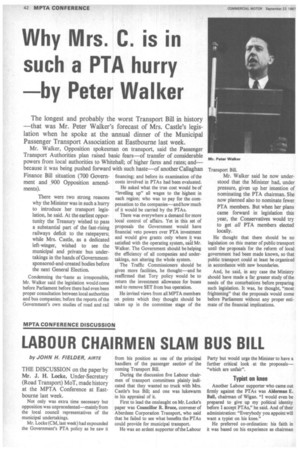Why Mrs. C. is in such a PTA hurry by Peter Walker
Page 44

If you've noticed an error in this article please click here to report it so we can fix it.
The longest and probably the worst Transport Bill in history —that was Mr. Peter Walker's forecast of Mrs. Castle's legislation when he spoke at the annual dinner of the Municipal Passenger Transport Association at Eastbourne last week.
Mr. Walker, Opposition spokesman on transport, said the Passenger Transport Authorities plan raised basic fears—of transfer of considerable powers from local authorities to Whitehall; of higher fares and rates; and— because it was being pushed forward with such haste—of another Callaghan Finance Bill situation (700 Government and 900 Opposition amendments).
There were two strong reasons why the Minister was in such a hurry to introduce her transport legislation, he said. At the earliest opportunity the Treasury wished to pass a substantial part of the fast-rising railways deficit to the ratepayers; while Mrs. Castle, as a dedicated left-winger, wished to see the municipal and private bus undertakings in the hands of Governmentsponsored-and-created bodies before the next General Election.
Condemning the -haste as irresponsible, Mr. Walker said the legislation would come before Parliament before there had even been proper consultation between local authorities and bus companies; before the reports. of the Government's own studies of road and rail financing; and before its examination of the costs involved in PTAs had been evaluated.
He asked what the true cost would be of "levelling up" all wages to the highest in each region; who was to pay for the compensation to the companies—and how much of it would be carried by the PTAs.
There was everywhere a demand for more local control of affairs. Yet in this set of proposals the Government would have financial veto powers over PTA investment and would give grants only where it was satisfied with the operating system, said Mr. Walker. The Government should be helping the efficiency of all companies and under' takings, not altering the whole system.
The Traffic Commissioners should be given more facilities, he thought—and he reaffirmed that Tory policy would be to return the investment allowance for buses and to remove SET from bus operation.
He invited views from all MPTA members on points which they thought should be taken up in the committee stage of the Transport Bill.
Mr. Walker said he now understood that the Minister had, under pressure, given up her intention of nominating the PTA chairman. She now planned also to nominate fewer PTA members. But when her plans came forward in legislation this year, the Conservatives would try to get all PTA members elected locally.
He thought that there should be no legislation on this matter of public transport until the proposals for the reform of local government had been made known, so that public transport could at least be organized in accordance with new boundaries.
And, he said, in any case the Ministry should have made a far greater study of the needs of the conurbations before preparing such legislation. It was, he thought, "most frightening" that the proposals would come before Parliament without any proper estimate of the financial implications.




























































































































